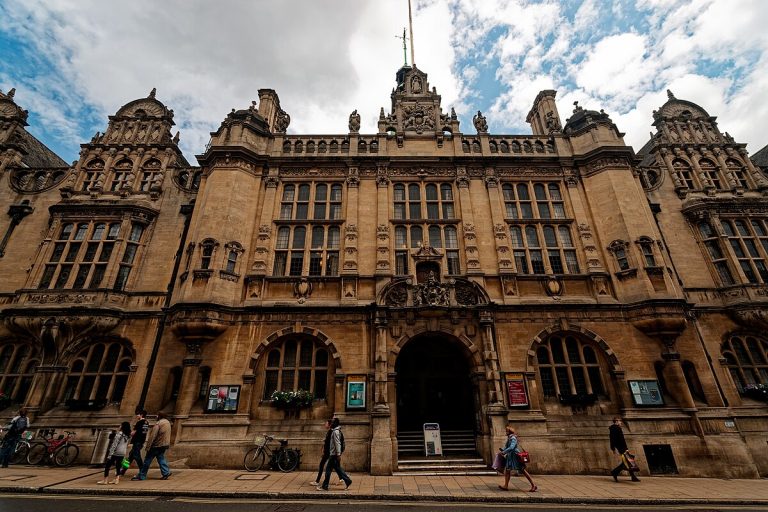Monday 5th August saw antifascists rally at Oxford’s Carfax Tower in a show of solidarity with communities of colour and a rejection of the racist violence that has engulfed Britain in recent days. The tragic murder of three young girls in Southport led to an explosion of misinformation as false rumours that the killer was a Muslim asylum seeker gained massive traction online. Far-right protesters first attacked Southport’s mosque before bringing riots and racist attacks to towns across the country. Wednesday 7th was anticipated to be a nationwide day of action for the far right, with more than 100 anti-immigration protests purportedly planned, including one in Oxford. But they didn’t turn up. Maybe they remembered what happened last time the far right were faced with antifascists in Oxford. It didn’t end well for them.
The Battle of Carfax is the lesser-known brother of the historic Battle of Cable Street, when the people of London’s East End fought against a British Union of Fascists (BUF) march designed to threaten the area’s large Jewish population. While Cable Street was a deliberate provocation in an area naturally opposed to fascism, Carfax was the culmination of an attempt to drum up support in Oxford for the BUF, the main fascist party in Britain throughout the 1930s. The BUF had received large donations from William R Morris, a businessman and the founder of Nuffield College. Even more shamefully, Oxford was home to the Oxford University Fascist Association (OUFA), which was one of the country’s most active fascist student groups and whose members praised Hitler.
A few months before his Blackshirts would march on East London, the BUF’s aristocratic leader Oswald Mosley scheduled a meeting for the Carfax Assembly Rooms (now the site of HSBC) after being denied the use of the Town Hall. He had visited the OUFA once before in Carfax three years previously, a meeting which was relatively uneventful (some reports suggest this was because leftists in the city were otherwise busy that day). On the 25th May 1936, Mosley and his jack-booted lackeys descended on Oxford. Fascism was more notorious in Britain by then: the Nazis had begun their murderous march across Europe with the reoccupation of the Rhineland in March that year and already antisemitic persecution of German Jews was rampant.
This time, Oxford’s residents would be prepared for the Fascists. The meeting halls were packed: around 1000 people attended Mosley’s speech, many of whom were not there to applaud. Those who fought against Mosley’s men that day were mostly ‘Town’ rather than ‘Gown’: antifascist workers and bus drivers, Jewish residents and leftist activists. Oxford was a very different place then; both the Oxford University constituency and Oxford itself were longtime Tory stalwarts. Compare that to Cherwell’s recent polling showing the resounding strength of Labour among the student body. Of course, the vast majority of Tory voters would not have supported Mosley’s Fascists, but Oxford’s clear right-wing lean was fairly fertile ground for Mosley’s insidious ideas to spread.
Mosley addressed the crowd to the tune of the Nazi Party’s anthem, levelled antisemitic bile at the Labour Party and at one point insulted the antifascist hecklers from primarily working-class Ruskin College, mocking their “stage guardsmen accents”. When Blackshirts tried to violently remove Liberal journalist Basil Murray from the meeting, the powder keg was sparked. Future Labour politician Richard Crossman recounted:
“[Murray] was dragged off his chair by the face, one Blackshirt digging his nails into his cheek” and was “dragged along the floor, and rabbit punched from behind”. As antifascists fought back using chairsone Christ Church tutor was “roused to a berserk fury” after being hit with a steel chain by a Blackshirt.
The result? On the antifascist side, some nasty bruises and cuts. On the Blackshirt side, four men hospitalised. The result was no less humiliating for Mosley himself, who scarpered out of a side entrance once the fighting began and never held a meeting in Oxford again. The violence initiated by Mosley’s supporters that day, antifascist activism by people such as Abraham Lazarus and later the horror of the Spanish Civil War discredited the BUF in Oxford and their support plummeted.
The violence of Mosley’s Fascists mirrors the violence of today’s far right; this time, they were dwarfed by the sheer number of counter-protesters preaching peace and tolerance, and violent clashes between both groups were largely avoided. The Battle of Carfax is a vital chapter in both the history of Oxford and of British antifascism. Those who came to protest Mosley largely did not seek violence, unlike his thugs. Those who protest the far right today largely do not seek violence either. For violence is inherent to far-right ideology; as shown in Oxford, my very own Walthamstow and across the country, antifascists win through peace.











